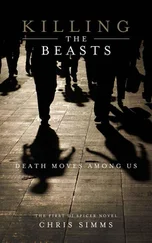“India.”
“Oh yes, India. Not to mention Australia. You know kangaroos carry de souls of dead aborigines in deir pouches …”
The myths and lies tumbled out and Elvis had believed everything, or at least wanted to. The sad thing was, Jagua did too. Now that he was older, Elvis realized there wasn’t much truth in Jagua’s fantasies.
Jagua yawned as he chomped on his chewing-stick and spat a fine spray of chewed fiber and spittle, scratched his belly and looked at Elvis.
“Good morning, Jagua,” Elvis said.
“Elvis. You go late for work, you know. A punctual man is a spiritual man,” he replied.
“I’m just leaving now,” Elvis said.
“Good.”
Elvis was about fifteen minutes late, and as soon as he got to work he sensed the tense atmosphere. It was the way nobody would meet his eyes. His feeling of unease grew as he walked through the large compound to his station. He had been late before, so what was the big deal now? As he bent to lift a freshly mixed pan of cement onto his head, the chief mason stopped him gently.
“De site manager want to see you,” he said, his calloused palm gently rubbing Elvis’s arm.
It didn’t sound good. It was bad enough when the foreman wanted to see you; but the site manager, well, that was a different matter altogether. Elvis had only seen the site manager from a distance, and there had been no reason for them to speak. Elvis set the head pan down and crossed the compound to the site manager’s caravan, tapping quietly on the door.
“Come in!” a voice barked.
Elvis opened the door and stepped into the cool air-conditioned interior. The floor was covered in plush carpeting and he instinctively took off his mud-splattered shoes, even though he did not step off the rough hemp doormat into the room. The site manager was a young man, in his early thirties. When Elvis came in he was reading a James Hadley Chase novel. He put it down and regarded Elvis through bored eyes.
“Yes?” he asked.
“You asked to see me,” Elvis replied.
“See you?”
“I am the laborer from section six, sir.”
“Oh yes, section six. So you are de habitual latecomer?” As he spoke, he flipped through some papers on his desk.
“Sir?”
“De habitual latecomer,” he repeated.
“No, sir. I have been late only once or twice before. I am sorry, sir. It will not happen again.”
The site manager stared at Elvis for a long time. He hated having to deal with these people. Firing and hiring laborers was not his department, but since he had fired the foreman that morning, he had to do this dirty work now. His father, who owned the construction company, had called and told him to lay off as many people as he could, starting with the foreman — something about being over budget.
“I am terminating your appointment. As from now.”
“Please, sir …”
“Don’t beg. Don’t waste my time. Just get out.”
“But my wages for—”
“Before I count five you should be gone, otherwise I will have some of de boys eject you forcibly. One, two, three …”
There really wasn’t a lot Elvis could do, so he shuffled out of the compound. None of the other workers looked at him, partly from shame, partly to avoid contagion from his bad luck. He didn’t blame them. He would have done the same in their place.
As he waited at the bus stop, he noticed that the traffic had come to a complete standstill and people were running, pursued by policemen, soldiers and local government officials in their dirty brown uniforms. A crowd gathered round a bonfire that was steadily growing in size.
“What happened here?” Elvis asked a groundnut-and-banana hawker who dashed past him.
“It is task force,” was the curt reply. It sounded ominous, connoting horror so strong that Elvis shivered and looked up quickly, half expecting to see some malevolent manifestation.
A man came running toward him, carrying some clothes on hangers, a policeman hot on his heels. Just before he got to where Elvis stood, the man tripped and fell. The policeman pounced on him and snatched the clothes away, carrying them to the raging bonfire and throwing them in. As they crinkled and burst into flame, Elvis, drawn to the fire, walked over and stood watching.
The heat slowly crumbled the fuel and the flames reflected off the face of the fallen man. Still prone from the policeman’s tackle, he watched the fire slowly turn his goods into a mass of hot ashes.
“But I get ten children,” he mumbled over and over. “How I go feed dem?”
Unsure why, Elvis put his arm around the man’s shoulders and helped him to his feet.
“Take heart, brother,” he said.
The man turned to him.
“I try to make money begging, but my spirit wan’ die. So I borrow money, begin to sell dese Okirika.”
Elvis nodded. He knew the man was referring to the secondhand clothes smuggled in from Cameroon through the port town of Okirika.
“Every day I go walk up and down, ringing one small bell make people see me,” the man continued, his voice breaking. He stared into the blaze and the flames ripped through his heart, the fire entering him. His mind reached back and, like a dead star, collapsed upon itself. He screamed. It was sudden. The sound startled Elvis, who let go of the man and jumped back. It also startled the crowd of strangers and other spectators gathered round the fire, and they turned to look. The man screamed again and tore his clothes off, dancing around the fire naked, emitting piercing calls, bloodcurdling in their intensity.
Before anyone could react, he jumped into the fire. As the flames licked around him, it seemed the fire smacked its lips in satisfaction. And in the fire, he continued to yell as he wrestled with it. The last thing Elvis heard before the man died was his terrible laugh. Its echo hung in the air. He never thought to ask the man’s name.
“Ah, madman,” someone sighed.
Elvis got off the bus and trudged past the buka where he normally ate. He lingered hungrily outside, but he couldn’t shake the smell of burning flesh or the sight of the man writhing in the flames. He wondered why he hadn’t helped. Instead, he had just stood rooted to the spot, staring.
A quick count of his money made it quite clear that he couldn’t afford to buy a meal even if he could face it.
He turned away and headed home. It wasn’t even noon yet, he noted. How was he going to spend the rest of his day? He had been fired from the building site, and his long absence from Iddoh Park and the beach had cost him his spot there. He needed money to buy a new spot, money he didn’t have. He felt a little ashamed at how quickly the practical pressures of living had usurped the image of the burning man.
“Elvis!”
He spun around. A man stood in the open door of the buka, dressed like Superfly. Elvis did not recognize him, and the man, noticing his confusion, explained.
“It’s me. Okon.”
It hit him. It was the man he had fed barely a week ago, at this same buka. Okon was the man who had scrabbled in the dirt for rice. How come he was so kitted out now? Had he taken to a life of crime? Elvis smiled at Okon, straining to mask his thoughts. He really wasn’t in the mood for company, but his hunger got the better of him, so he went back. They sat facing each other, caught in an awkward silence broken only by Okon’s occasional repetition of his name—“Yes. It’s me. Okon. Okon”—as if this mantra would bond them. Finally he of fered Elvis a drink and some food.
“Take anything you want — extra meat, stout, anything.”
Elvis smiled uncomfortably and ordered some eba and egusi sauce.
“No big stout?” Okon asked sounding a little offended.
“No thanks. A Coke will be fine.”
Читать дальше












